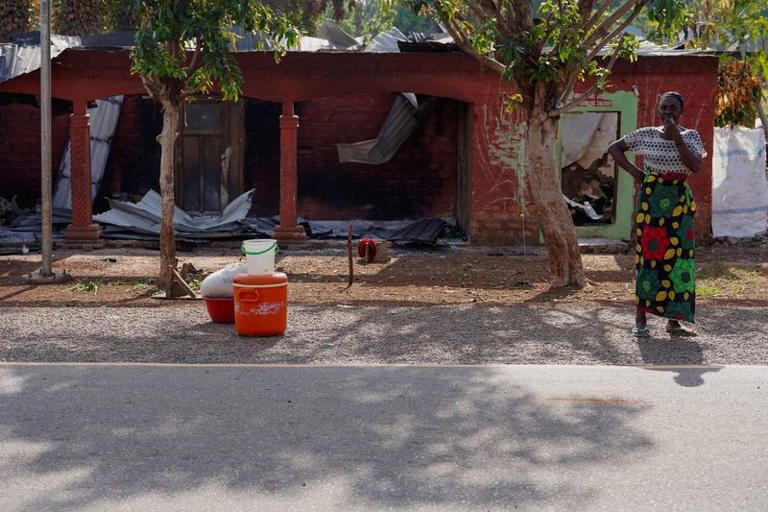Benue Massacre: Over 200 Killed at Catholic Mission in Yelewata

In the early hours of June 13, 2025, the farming community of Yelewata in Benue State, Nigeria, faced a brutal attack that killed more than 200 people. The victims, mostly Christians seeking refuge at a Catholic mission, fell victim to heavily armed Fulani militia. This massacre represents the deadliest single assault in the region’s recent history. It has reignited international concern over Nigeria’s rising religious violence and prompted renewed calls from the U.S. Commission on International Religious Freedom to designate Nigeria as a Country of Particular Concern.
Attack Details and Survivor Accounts
Survivors described a night of terror beginning around 10 p.m. More than 40 gunmen stormed Yelewata on motorcycles. They shouted religious slogans and opened fire indiscriminately. Witnesses said the attackers, speaking Hausa and Fufulde, moved from house to house, setting buildings on fire and killing residents, including women, children, and internally displaced persons (IDPs) who had fled earlier violence. “They surrounded Yelwata and began slaughtering people—mostly women, children, and displaced families who thought they had found safety here,” said Mton Matthias, a local youth leader. “We’re still finding bodies in the bushes. The death toll is rising every hour.”
The Catholic mission, once a sanctuary for those escaping attacks, became the epicenter of this violence. Father Ukuma Jonathan Angbianbee, the parish priest, survived by dropping to the floor of the church’s presbytery as gunfire erupted. “What I saw was truly gruesome. People were slaughtered. Corpses were scattered everywhere,” he told Aid to the Church in Need. Many victims burned beyond recognition. The market square, where IDPs sought shelter, lies in ruins.

Wider Violence and Humanitarian Crisis
The Yelewata massacre is the latest in a string of coordinated attacks sweeping Benue State. In the days before June 13, armed groups struck Aondoana, Edikwu-Ankpali, and Akundu-Tyough, killing dozens and displacing thousands. On the same night as the Yelewata attack, Fulani militants killed several Nigerian soldiers at a military post near Daudu town. These events highlight the scale and coordination of the violence.
The humanitarian toll is staggering. Over 6,000 people fled their homes due to the June attacks alone, joining more than 150,000 already displaced by the herder-farmer conflict since 2011. Local officials and aid workers warn of a looming health crisis. Survivors face threats of cholera and typhoid amid overcrowded camps and destroyed infrastructure.

International Response and Government Action
International outrage came swiftly. Wissam al-Saliby, president of the religious freedom group 21Wilberforce, called the massacre “a crisis of global conscience.” He warned that the growing aggression of Fulani militants threatens one of West Africa’s most significant security risks. “If immediate action is not taken, religious minorities in northern Nigeria will continue to face policies and practices that seek to remove their very presence. Terrorist violence will further compound one of the worst humanitarian crises in the world,” he said.
The U.S. Commission on International Religious Freedom renewed its call for Nigeria to be designated a Country of Particular Concern. They cited ongoing attacks on Christian communities and the government’s failure to stop the violence. “For this pattern of attack on mostly Christian villages to continue without restraint is totally unacceptable. Christians in the Middle Belt of Nigeria need to know their government is willing to do what is needed to secure the safety of all citizens, regardless of ethnicity or religion,” said Jo Newhouse, spokesperson for Open Doors.
President Bola Tinubu ordered security forces to tackle the herder-farmer conflict in Benue. The military claims to have neutralized some attackers, but many survivors doubt the government’s ability to protect them from future violence.

Root Causes and Future Outlook
The conflict in Benue stems from long-standing disputes over land and resources between mostly Christian farmers and mainly Muslim Fulani herders. However, the attacks’ increasing frequency and brutality, often accompanied by religious slogans and targeting Christian institutions, raise fears the violence is becoming explicitly sectarian.
As Yelewata mourns, survivors face an uncertain future. Many have fled again, seeking safety elsewhere. Church leaders and humanitarian groups strive to provide emergency relief, but the tragedy’s scale overwhelms local resources. The Diocese of Makurdi Foundation described the aftermath as “an eyesore, not a sight for anyone to behold. Some bodies were burned beyond recognition: infants, children, mothers, and fathers just wiped out.”
The Yelewata massacre starkly reminds us of the urgent need for decisive action. Both the Nigerian government and international community must address the violence’s root causes, protect vulnerable populations, and prevent such atrocities from recurring. As global attention turns to Benue, hope remains that survivors’ voices will prompt meaningful change.

